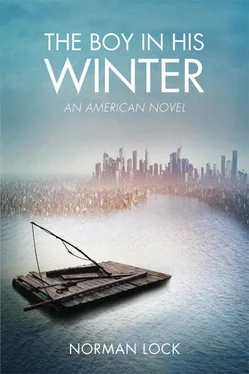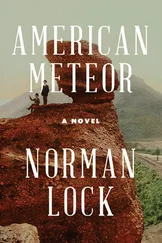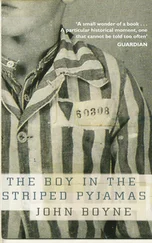Then why, you ask, am I writing this book, which is a return to a dubious past?
What else can a man do who has used up his future? And if I should die before finishing this — what will happen to the boy and the black man on their raft?
EVERY THIRD DAY, I LET JIM BE CAPTAIN of the raft. I was captain more often than he because I took pleasure in it, not because I considered Jim incompetent. His pleasure was to take inventory of the valuables stolen from Miss Watson’s and Judge Thatcher’s houses. We had between us a mother-of-pearl opera glass; a phenakistoscope, with which we watched a Scotsman jig, a circus girl jump, and a bass fiddler fiddle; a barometer that neither rose nor fell but always stayed the same; an ivory-handled revolver without bullets; a bottle of cod-liver oil to pour down the throats of our enemies; The Pilgrim’s Progress to read to our enemies as a punishment; two tobacco pipes, one corncob and one briar wood; a jar of navy plug tobacco; an onyx letter opener; a splinter that had entered Judge Thatcher’s left foot in 1802 and emerged twenty years later to the day from his right foot; a stovepipe hat; a file in case Jim was ever chained up again; a petrified frog once belonging to Tom (the same frog Jim had seen Marie Laveau resurrect); a darning egg; a viola whose bow Tom had broken playing Robin Hood; Aunt Polly’s christening spoon; a marlinspike; a frock coat; fire tongs; a cast-iron dog; the jug of rye whiskey; a box of locofoco friction matches; sealing wax; and a bar of Belgian soap in the shape of a hot-air balloon.
Jim liked to make up stories about the valuables: how they might behave if they could talk or how we might make outlandish use of them, such as steering the raft by whatever way the darning egg rolled, in order to avoid snags and wrecks, or sawing on the viola strings with the petrified frog. He thought this might raise a chorus of the dead and cause the varmints inside our clothes to jump overboard. He liked to tell me about the creation of the world from a handful of mud and thorns, about the moon’s whispering secrets all night to the sea, the noise of stars, the drowned who coursed forever through the river’s veins, a woman who ate her children, and the sad wedding of a weeping willow to a locust tree. Jim’s themes tended toward sadness, which must come naturally to a man bereft of nearly everything.
Once, Jim shocked me by putting on a frock coat and a stovepipe hat (belonging to the judge), and with his hand gripping the sternpost as if it were a podium, he recited from memory Lincoln’s Gettysburg Address. He would never say how he had come by the text, not even when I dosed him with rye whiskey to make him talkative. While Jim was no teetotaler, he couldn’t handle liquor and would fall asleep before he could be coaxed into revelation.
“Do you think God made us all equal, Jim?” I asked when he had recovered his wits and the power of speech.
“Yes, Huck,” he said simply, so that I was ashamed to think otherwise.
When John Wilkes Booth shot and killed Old Abe, Jim was inconsolable for days afterward, weeping and gnashing his teeth and jabbing at his leg with the marlinspike, until I feared he might throw himself overboard or at the very least lose his mind. I didn’t know what I would do with a deranged black man on such a small raft. I thought of putting him ashore but couldn’t bring myself to abandon him. I would sooner have set a Christian in a coliseum rampant with starved lions. Jim was my friend, and if grief turned him into a raving lunatic, then so be it.
We’d found the patent-medicine bottle in the fall of 1862, below Memphis. We floated down to Vicksburg, a distance of 180 river miles, in about one hundred days, arriving in the middle of the Union siege of that Mississippi town, on June 21, 1863. We’d made unusually good time for a raft steeped in legend, a speed Jim attributed to the overriding effect of “historical urgency.” (Did Jim say that, or did I read it somewhere much later, after I had embarked on a serious study of time travel, commencing with Minkowski’s Space and Time, which I didn’t understand?)
Listen: Every author wants to write at least one time-travel novel in his or her life. If I failed to produce mine, it was not for lack of trying. I would lose myself in the bewildering complexities of the subject. After a while, I didn’t know whether I was coming or going.
There was one other valuable, which I forgot to mention: a fragment of a meteorite that had fallen on the shore of Bull Shoals Lake, where Judge Thatcher had gone fishing for walleye. I have wondered, often in the years since our journey, if the “thunderstone,” as Jim liked to call it, did not possess otherworldly properties. Jim would hold it to his ear as you might a conch to overhear the roar of a distant sea. He claimed he heard planets hissing down the black jetties of space, whales breaching tropical seas, an unknown music called jazz, and a prophecy of a second Flood.
The past is vivid. Don’t you find it so? It’s like watching a movie in Technicolor while the present, in which I am engulfed, is black and white and fading before my very eyes. A specialist in mental disintegration once wrote that mine was an extreme case of arrested development. Jim knew better when he said my boyish heart had been flummoxed by time and my brain soused by too much Mississippi River water.
AT VICKSBURG, WE LEFT THE RAFT for the first time since the winter of 1850. We could go no farther, because of Pemberton’s cannonading from the bluffs overlooking the river and Grant’s bombardment of the beleaguered town from the opposite bank. Outwardly, Jim and I had not changed. How our thoughts and tempers may have been altered by experience, I cannot guess. We had seen death pass by us on the river, but death had been ample in Hannibal, too. In those days, the mortuary parlor was not the exclusive precinct of the recently departed. Death was present in houses and on the streets. More than once, Tom and I had stumbled onto corpses while hunting river rats or searching the rank mud for pirate treasure. The Mississippi was a river of the dead as familiar to us as Lethe or Styx to the ancient Greeks, and occasionally it would deliver up from its abundance the well-washed bodies of the murdered and the drowned.
Jim and I hid the raft in a bayou and waited for the town to fall, which it did to hunger, dysentery, and malaria as much as to the ceaseless shelling by Union artillery and gunboats. The Confederates surrendered on the Fourth of July, 1863, and Jim and I wandered the ruined town and the “prairie-dog village” dug out of the yellow-clay hills above it. We marveled at earthen living rooms like caves domesticated by fancy carpets, beds and other furniture, with slaves to wait on tables, though their masters, after a forty-eight-day siege, had little to eat except their own shoes. Jim and I didn’t think much about it, not being hungry ourselves. Besides our seemingly inexhaustible provisions, the Mississippi was generous with its fish. If Jesus had been in Vicksburg then — which he most certainly wasn’t — he would have had more than three little fishes with which to work his miracle. My God, but the river was rich, unlike now, when we’ve sown the waters with poison and brought forth deformity and death unimaginable in the days of our youth. As I recall, Jim and I were never thirsty, either. We had aboard the raft a jug as miraculous as Cana’s, which was filled always with sweet water. It was wonderful drizzled into rye whiskey.
The slaves looked at us with mistrust and, I thought, resentment.
“Because you seem to them a freeman,” I said to Jim in explanation.
“Because for you, this is just scenery,” said Jim. (Or maybe I read it in his eyes.)
He may have been right to think I made a cartoon out of suffering. He understood people better than I. Pain had made him sensitive; loneliness (he was lonely even when in company), alert to the slightest motions of the hearts of others. I wouldn’t say Jim was a better man than I. To ennoble is to diminish by robbing people of their complexity, their completeness, of their humanity, which is always clouded by what gets stirred up at the bottom. Jim was only sometimes brave, sometimes good, and sometimes wise. The same can be said for most of us. And Jim never got the chance to flower or to fall.
Читать дальше












